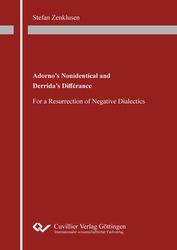| Areas | |
|---|---|
| Serie de libros (96) |
1381
|
| Nachhaltigkeit |
3
|
| Gesundheitswesen |
1
|
| Letra |
2370
|
| Medienwissenschaften | 16 |
| Teología | 57 |
| Filosofía | 102 |
| Derecho | 424 |
| Economía | 851 |
| Ciencias sociales | 418 |
| Ciencias del deporte | 48 |
| Psicología | 233 |
| Educación | 190 |
| Historia | 183 |
| Arte | 111 |
| Ciencias culturales | 166 |
| Literatur | 117 |
| Lingüística | 88 |
| Ciencias Naturales |
5408
|
| Ciencias Ingeniería |
1795
|
| General |
98
|
|
Leitlinien Unfallchirurgie
5. Auflage bestellen |
|
Erweiterte Suche
Adorno’s Nonidentical and Derrida’s Différance (Tienda española)
For a Resurrection of Negative Dialectics
Stefan Zenklusen (Autor)Previo
Lectura de prueba, PDF (240 KB)
Indice, PDF (190 KB)
The virulent anti-Hegelianism of French poststructuralism and its (difficult) confrontation with Jürgen Habermas has long obscured the closeness of Jacques Derrida’s “différance” to Theodor W. Adorno’s “Nonidentical.” Taking the overarching theme of “identity and difference” as a guide, we can peel apart what unites and separates these two thinkers. In so doing, certain “de-realizing” effects of Derrida’s entrapment in signs reveal themselves. By contrast, Adorno’s social and cultural diagnosis, when extrapolated to a post-Fordian context is astonishingly fruitful. Attempts to trivialize negative dialectics as a model of intellectual self-understanding from a past age or as an esthetic reserve of ways of life are untenable.
| ISBN-13 (Impresion) | 9783736973046 |
| ISBN-13 (E-Book) | 9783736963047 |
| Formato | A5 |
| Idioma | Inglés |
| Numero de paginas | 182 |
| Laminacion de la cubierta | mate |
| Edicion | 01 |
| Lugar de publicacion | Göttingen |
| Fecha de publicacion | 06.11.2020 |
| Clasificacion simple | Libro de divulgacion |
| Area |
Filosofía
Filosofía sistemática Ciencias sociales Sociología |
| Palabras claves | Nichtidentisches, Nonidentical, Différance, Negative Dialektik, Negative Dialectics, Identität, Identity, Differenz, Difference, Dekonstruktion, Deconstruction, Kritische Theorie, Critical Theory, Phänomenologie, Phenomenology, Immantenismus, Immanentism, Poststrukturalismus, Post-structuralism, Logozentrismus, Logocentrism, Phonozentrismus, Phoncentrism, Sozialdarwinismus, Social Darwinism, Neoliberalismus, Neoliberalism, Adorno, Derrida, Husserl, Heidegger, Bourdieu, Hegel |








